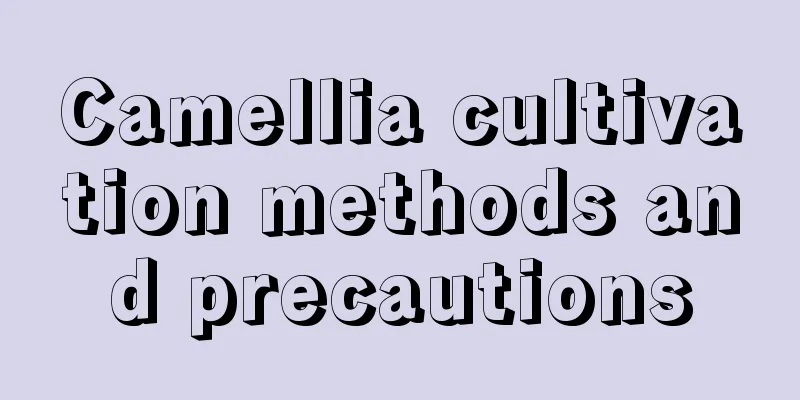Camellia cultivation methods and precautions

|
Camellia is deeply loved by people for its evergreen nature, elegant flowers and rich fragrance. However, although many flower lovers grow camellia, they are always unable to take good care of it and various problems arise. Let’s learn about the camellia cultivation methods and precautions below. 1. Fertilization When planting or repotting, apply an appropriate amount of decomposed organic fertilizer or bone meal as base fertilizer at the bottom of the pot to increase soil fertility. In spring, apply nitrogen-based fertilizer every 10 days to promote new bud growth and branch lignification. During the flower bud differentiation period, apply phosphorus and potassium fertilizers instead, and apply a dilute potassium dihydrogen phosphate solution once every 10 days to promote flower bud formation. In autumn, apply phosphorus and potassium fertilizers once every half a month to help the plants survive the winter safely. 2. Watering The principle of watering camellia is "water thoroughly when dry". Water when the soil surface is dry and white and the leaves are slightly drooping. In spring, keep the soil in the pot moist and water it once every 1 to 2 days; in summer, water it once in the morning and evening to keep the bottom of the pot moist, spray water frequently to cool down and increase humidity, and avoid watering at noon. In autumn, water once a week; in winter, water about 2 times a month. 3. Lighting Camellia needs 6-8 hours of light per day to grow and should be placed in a well-lit location. Avoid prolonged exposure to strong direct sunlight, provide shade in summer, and allow sunlight all day in winter. 4. Soil Camellia is suitable for loose, breathable, fertile and slightly acidic soil, and should avoid using heavy clay soil and saline-alkali soil. Recommended soil formula: 3 parts garden soil + 3 parts river sand + 3 parts coal slag + 1 part coconut bran to ensure good air permeability and water and fertilizer retention capabilities. 5. Notes Watering should be done at noon in winter, and avoid watering when the temperatures are low in the morning and evening. At the same time, pay attention to the water temperature should be close to the potting soil to reduce damage to the plant. When the temperature exceeds 30°C in summer, camellia enters a dormant period. At this time, watering and fertilization must be controlled to avoid affecting the health of the plant. In short, even in its dormant period, camellia likes a humid environment. You can increase the air humidity by spraying or placing water trays, but avoid letting the spray fall directly on the flowers and leaves to avoid causing diseases.
|
<<: Winter Strawberry Planting Methods and Techniques
>>: Winter Tomato Planting Techniques
Recommend
Seed propagation of Ailanthus
Seed propagation of Ailanthus Live seed broadcast...
What is the best season to plant sweet potatoes? Sweet potato planting time and method
When planting sweet potatoes, the first thing to ...
How to plant ginger in pots after it sprouts
1. Cut into small pieces Cut the sprouted ginger ...
How often should I water Molan? What should I pay attention to when watering?
How often should I water the molan? Mo Lan likes ...
What to do if black spots appear on the leaves of green radish
1. Proper shade Reason: Pothos is suitable for gr...
How should we water and care for the snake plant in summer?
Tiger Skin Orchid is a common foliage plant with ...
Can used tea leaves be used to grow flowers? Put the used tea leaves in the flower pot as fertilizer to grow flowers
Can you grow flowers with brewed tea leaves? Alth...
Things to note when Cyclamen blooms, what to do if the leaves turn yellow when it blooms
1. Precautions during flowering period 1. Light: ...
Cultivation methods and precautions for small fern pots
1. Maintenance methods 1. Soil: It is best to cho...
Is it better to grow bougainvillea in a large or small pot?
Is it better to use a large or small pot for boug...
Can daffodils bloom in the second year?
1. Can it bloom? Daffodils can bloom in the secon...
Can rose shoots be transplanted (how to change the pot after the rose shoots emerge from the soil)
Can I change the pot when the rose sprouts new sh...
How to grow red peony
Spring maintenance A year's plan begins with ...
What are the varieties of peony?
Main Function The peony has beautiful leaves, exq...
Can potato sprouts be grown hydroponically?
Can potato sprouts be grown hydroponically? Potat...









